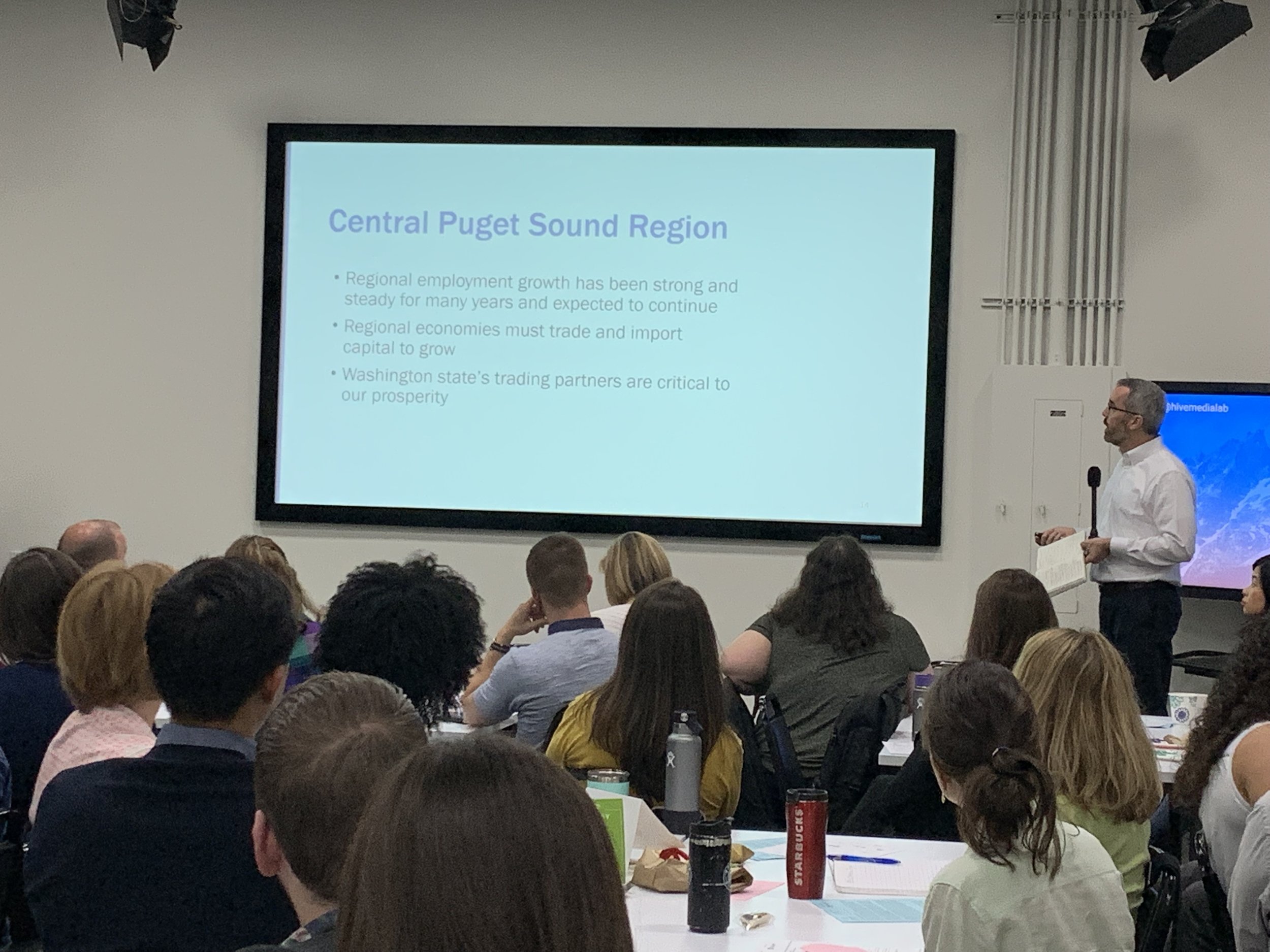Challenge Day Reflections: Economy, LT'19
Economy Challenge Day
May 9, 2019
To keep you connected to LT and the current issues and topics discussed in the curriculum, LT shares highlights and resources from the recent Challenge Day. We hope you enjoy these monthly updates!
At the Economy Day, held at the Hive Media Lab, LT'19 assessed the economic health of our region through the economic levers of workforce/education, technology/innovation, infrastructure/transportation, and regulatory/tax climate; explored how race and racial equity impact economic opportunities; and explored through an economic lens how the choices we make impact our community.
Our Economic Context
Chris Mefford, LT’08, LT Board of Directors, President & CEO, Community Attributes Inc.
Chris Mefford began by sharing a brief overview of current economic trends. We are at full employment – both locally and nationally. The economy continues to grow, with growth happening more rapidly in Seattle. According to economic forecasts, growth is inevitable, and we need to focus our efforts on growth management.
There is a business case for companies to address equity and racism. As one example, companies are currently spending a lot of money to recruit talent from outside the region, as well as to pay for work visas. It would cost less money to invest in our region and ensure that everyone has access to the education and training needed to fill these jobs. Additionally, with talent as scare as it is, any employer that has bias in their hiring practice is narrowing their employee field.
The business climate in Seattle can be divisive, and sometimes people view big companies as “bad.” However, many small businesses are reliant on big companies. Additionally, by shifting how we look at big companies, we can better encourage them to be community stewards and invest in our region (the bottom layer of the pyramid above).
Resources:
Leadership Reflections
Tony Mestres, President and CEO, Seattle Foundation
Interviewed by Ted Schneider, LT’12, Curriculum Committee
Ted Schneider engaged Tony Mestres in a fireside chat-style discussion of philanthropy in the context of our current economic and social challenges. As the President and CEO of the Seattle Foundation, Tony emphasized that he runs a for-impact organization, and there are opportunities for the private and philanthropic sectors to learn from each other.
Seattle has become one of the most economically unequal cities in the country, and people of color are hit first and worst. As an example, Tony cited the recent count of people experiencing homelessness. According to this year’s count, the number of people experiencing homelessness decreased by 1,000. However, the overall number of people of color who were experiencing homelessness increased by 8%.
Resources:
Read an article about the region’s wealth gap here.
Listen to this podcast for an overview of how the economy functions and perspectives on how to create a more perfect economy here.
Read this article about how black boys raised in America, even in the wealthiest families, still earn less in adulthood than white boys with similar backgrounds here.
Illustration of Levers: Through the Lens of Industry
Roundtable Leaders: Yasmin Ali, Founder, Skillspire; Jonathan Bahe, LT’14, Senior Associate, NBBJ; Amanda Dayton, Naval Engineer, Foss; B.G. Nabors-Glass, Vice President, Job Training & Education, Seattle Goodwill; Sara Jones, Innovation and Ventures Strategy, The Boeing Company; Uyen Nguyen, Co-Owner, Nue Restaurant; Jaja Okigwe, President and CEO, First Choice Health; Gerald Smiley, Representative, Laborers Union, Local 242; Xiao Wang, LT’16, Founder, Boundless; Beto Yarce, Executive Director, Ventures
Class members had the opportunity to learn about the economic levers by meeting in small groups with roundtable leaders who represented a variety of industries.
The roundtable leaders shared how economic levers (innovation/technology, education/workforce, infrastructure/transportation, and regulatory/tax climate) have impacted the growth and vitality of their company, both positively and negatively. They also shared how their companies contribute to increasing economic opportunity and a healthy community.
Resource: Read about economic levers used to rank Washington against other states here.
Trade Offs: Focus on Equity
In this exercise, class members were asked to test their leadership capacity to make difficult decisions. They were presented with five scenarios with two options to consider for each scenario.
For each scenario, class members weighed short-term verses long-term benefits, explored how the option could impact people of color and the community as a whole, and considered the possible impact of their decision on the scenario’s organization and employees.
As an example of a scenario, the class was asked to decide whether a 100-person company with 30% of its employees identifying as being female or non-binary, people of color, veterans, and LGBTQ should invest in its existing diverse employees or future diverse employees (via a paid summer internship program). Read about the other scenarios here.
Resource: Learn how King County outlines measures of equity and its strategies to improve opportunities here.







